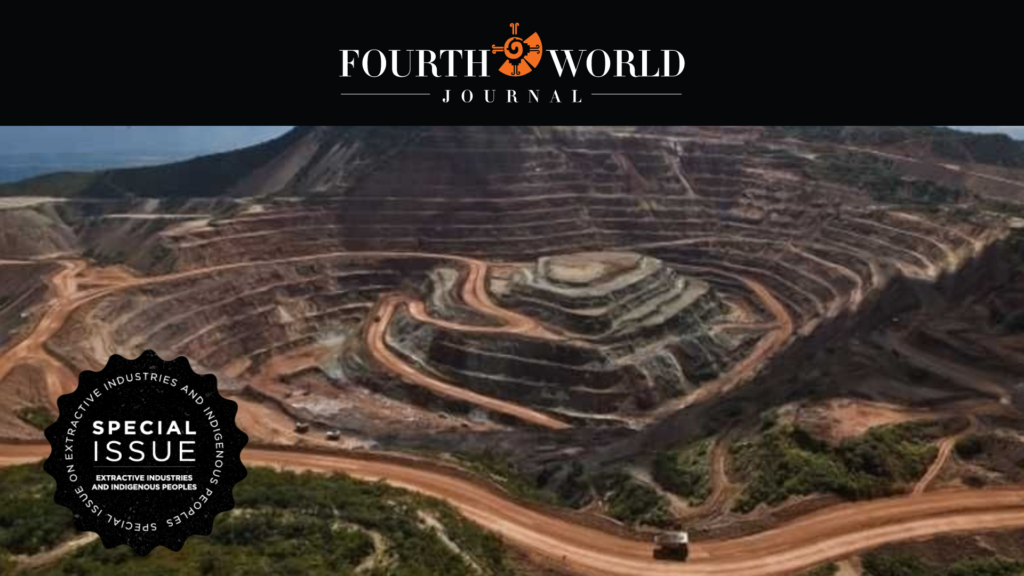


Subscribe
Fourth World Peoples worldwide face the daily challenge of whether they have access to the land that provides food, shelter, clothing, and safety. And if they live in cities or complex, large communities next to people who have never known life on the land, the challenges people face are not necessarily less overwhelming. People face structural, economic, and political inequalities though direct reliance on the land that ensures food, shelter, clothing, and safety is quite remote. All human beings directly or indirectly rely on the Earth’s nurturing lands for life.
When natural disasters violently force indigenous peoples to escape dangers threatening death or deprivation, they suffer. When human-created disasters violently force Fourth World peoples to escape the dangers of environmental breakdown, mass murder, destruction of villages, and or dislocation, they suffer. Fourth World peoples are suffering the consequences of human-made disasters because of transnational corporations engaging in mining, deforestation, petroleum, and agricultural exploitations conducted on Fourth World nations’ lands. “Land Rights” has for centuries remained the leading alarm called out by Fourth World peoples because of imperial and state expansion into and on top of native peoples’ territories.
Since the 1960s, international institutions have agreed to the lawful requirement that when a state’s government or state-created agent such as a corporation undertakes administrative, legislative, or judicial actions, they must negotiate an agreement with affected nations before proceeding. Suppose prospective actions adversely affect the lives and properties of indigenous peoples. In that case, before the state or corporation can take action, the affected nation must first give its consent to the activity. Obtaining consent requires negotiation between the interested state, corporation, and nation parties. Without the consent of Fourth World nations, corporations currently extract raw materials in the territories of nations with the complicit endorsement of state governments, banks, and investors. The state-supported corporations extract natural minerals, metals, wood products, and conduct agribusiness on nations’ lands destroying lands, dislocating peoples, promoting violent attacks on communities, breaking down biodiversity, and causing greenhouse gas imbalances. Millions of Fourth World peoples in more than 63 countries experience unregulated activities of transnational extractive corporations.
Recognizing that Fourth World peoples suffer at the hands of extractive industries that exploit their resources and directly and indirectly cause violence against communities, many non-governmental organizations advocate recognizing nations’ rights to their lands. They call for implementing the principle of “free, prior and informed consent.” Yet, “advocacy without enforceable solutions” has had little or no effect beneficial to Fourth World nations. International bodies such as the United Nations that hosted the establishment of conventions and other international laws requiring negotiated consent of nations go unenforced. Indeed, Dr. Deborah Rogers, leader of the vital organization Initiative for Equity, has reported that the UN responds to violations of Fourth World nations’ territories and peoples by corporations by saying controls “are out of our hands.” Dr. Rogers and her organization provided essential insights and on-the-ground revelations helpful to this Special Issue. She offered analysis, especially from her experience in the Democratic Republic of Congo, where transnational corporations exploit resources harming the lives and properties of the Twa and other peoples to extract gold, oil, and other raw materials.
Prompted by experiences and requests from Fourth World nations in Africa, Central America, Melanesia, the United States, and Canada, the Center for World Indigenous Studies formally undertook the Extractive Industries Initiative Panel beginning in April 2021. We set out to investigate possible strategies Fourth World nations can implement to reverse transnational corporation violations of their peoples and territories. We formed the Panel of Associate Scholars and advisors to conduct a 10-month investigation and a series of remote weekly colloquies to identify potential strategies. The initial result of our work in the spirit of activist scholarship is this Special Issue of the Fourth World Journal. The initial conclusions of the Extractive Industries Initiative Panel are presented in our overarching article, “Nations’ Land Rights vs. Corporate Exploitation,” followed by the graphic illustration work of Irene Delfanti and then full-length essays by several of the Associate Scholars, including Dr. Hiroshi Fukurai, Dr. Sabina Singh and Dr. Melissa Farley.
Publication of this Special Issue focused on extractive industries is intended to inform Fourth World nations directly and provide the basis for direct action by the nations themselves. The working premise of our analysis is that those who have capability must support Fourth World nations when invited by specific nations in a direct fashion to enhance their capabilities to prevent and regulate harmful extractive industry actions inside their territories. This transfer of technical support becomes essential since states and most corporations are unwilling to act on their own to regulate the consequences of extractive enterprises. We will reach out to non-governmental organizations, responsible states, and responsible corporations, urging their participation in actively supporting nations when those nations request support.
Our authors have undertaken deep inquiries to give active meaning to solutions.
We are grateful to the authors in their roles as Extractive Industries Initiative Panel members for their intensive participation in colloquies and narratives in the Joint Essay that leads off this issue of FWJ and as authors of insightful essay for this Extractive Industries in the Fourth World Special Issue.
For Spanish-speaking readers, two articles are also provided in Español.
The library is dedicated to the memory of Secwepemc Chief George Manuel (1921-1989), to the nations of the Fourth World and to the elders and generations to come.
access here